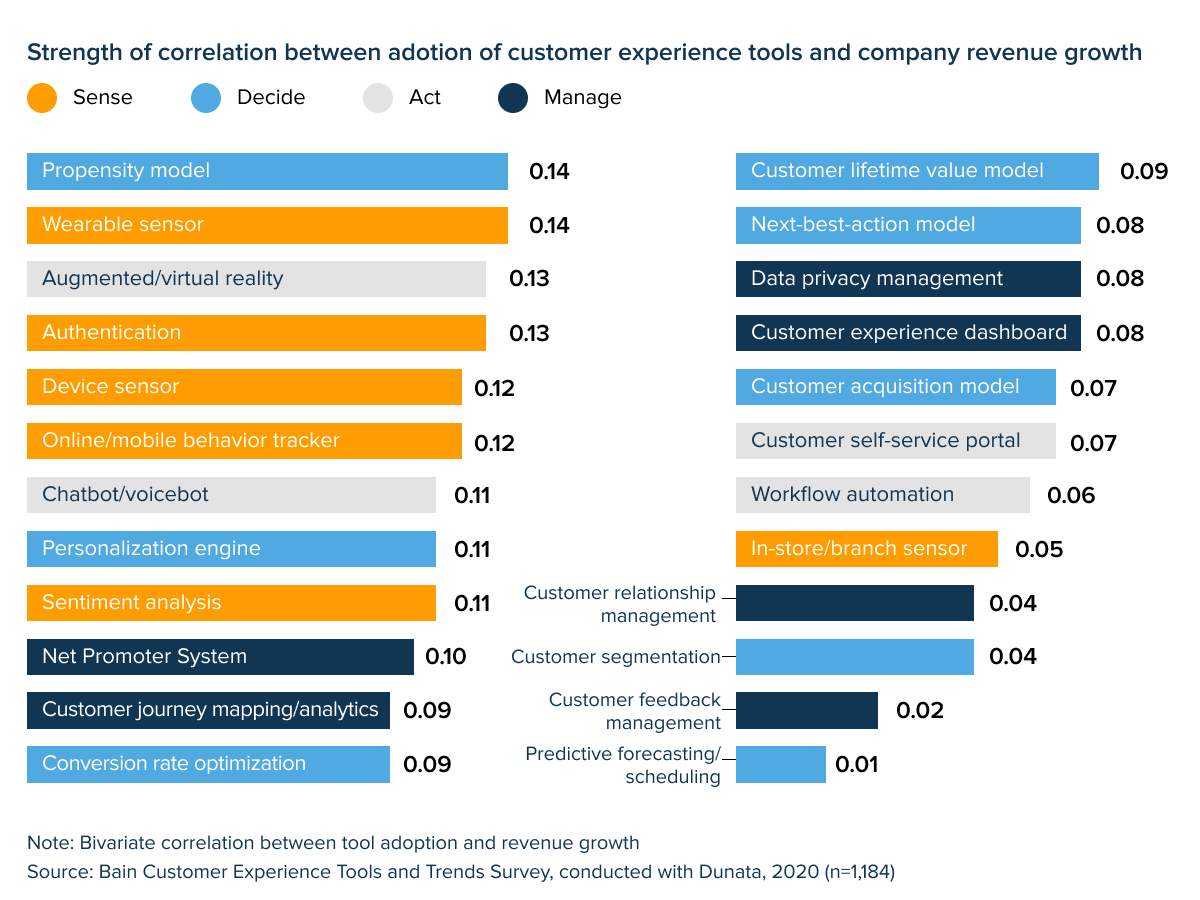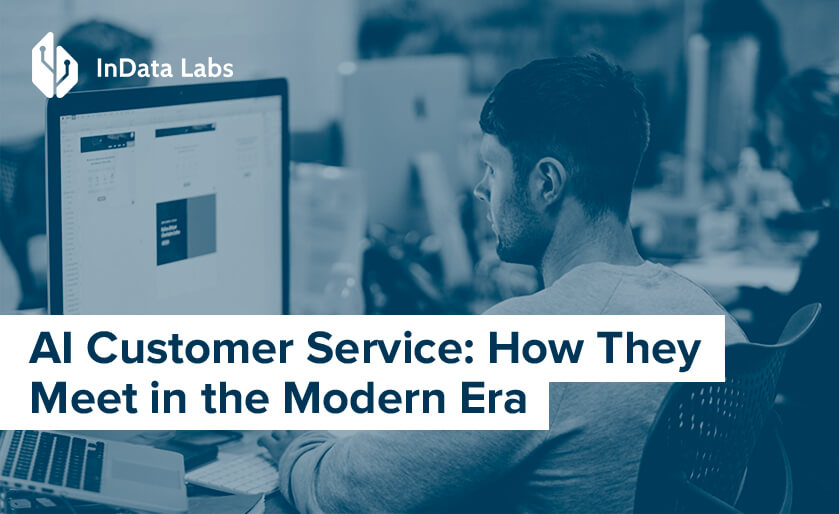In a world of uncertainty and ongoing pandemic, it is utterly important to ensure resilience and continuity for your business. Customer service improvement is one of the ways to prevent customer loyalty from fading and attract new regular clients.

Yet, you cannot tap into the minds of your customers to identify their expectations and relevant needs. But what if we tell you that it’s possible? Solutions of AI are already being employed to enhance customer service. Thus, smarter experiences account for a market size of $6,55 billion.
With that said, let’s have a comprehensive overview of AI customer service improvement strategies. Your business can leverage them to map positive customer journeys.
What do your customers want?
Affordable prices and quality offerings have always been at the top of the mind for customers. But in 2022, these two aspects are not enough to beat your competitors. To grow the customer base and inspire loyalty, you must provide extraordinary client experiences. And they begin with excellent customer service.
Your business never gets a second chance to make a first impression. After a single unfavorable experience, more than half of customers would switch brands. At the same time, 78 percent would continue to do business with a company that provided great customer service.
So what makes an excellent customer experience? According to PwC, almost 80% of American consumers point out speed, convenience, expertise, and friendly service. Global tendency attests to these factors. Customers want products and services that are easy to use and meet their needs.

Source: Unsplash
Among others, the report highlights the importance of tech-added value to the consumer journey. Clients want automation to ease the experience and value the relevance of marketing efforts.
And this is when AI and data-driven thinking step in.
How can AI improve customer experience: main differentiators

This means that businesses need to focus on delivering excellent customer experiences to stay competitive. And with the help of AI, this is becoming possible.
AI can help businesses understand their customers’ needs and preferences to provide tailored recommendations and solutions. Additionally, AI can automate customer service tasks, such as responding to inquiries or processing payments. Let’s see what benefits AI customer service improvement strategies can bring to the table.
Convenience
As our statistics hint, client convenience is key to boosting your business. AI and software can add a new wrinkle to the consumer journey by automating client pathways. Self-serve grocery stores like Amazon Go are prominent examples of checkout-free shopping. Thus, customers don’t have to waste in long checkout lines and have a smoother shopping experience.

Source: Unsplash
Proactive approach
Being where your customers are is important. Knowing where your customers will be is crucial. AI-powered data science customer analytics can help companies predict shifting customer behavior and evolving needs, thus forecasting relevant offers. For example, the Michelin Group leverages AI to determine in advance if a client’s tires need replacing. Companies like Amazon and Netflix also use AI-powered predictive analytics to target users and deliver a better user experience.
Targeted marketing initiatives
Smart marketing automation can also help brands deliver relevant offers and services. By analyzing user behavior, shopping history, and website journey, smart systems can predict the product or service your client needs at the moment and drive them to purchase. To catch the attention of a potential customer, personalized engagement reaches them with the right message, the right time of contact, and the right frequency of communication.
Also, AI algorithms can be employed to identify sentiment, thus basing your marketing efforts on first-hand feedback. Intel, Twitter, and IBM, for example, rely on sentiment-analysis software to determine employee concerns.
Real-time decisioning
Being able to process user data in sync is also a salient part of customer service process improvement. The combination of smart algorithms and data science can help businesses instantly source and analyze customer behavior. Moreover, they help predict and offer alternatives. Also, natural language processing, intent signals, and predictive analytics will promote faster access to the next best actions for the user.
A simple, yet prominent example of AI real-time decisioning is to identify users that are using ad blockers. Companies then offer them alternative UI components that can continue to convert them into customers.

Source: Unsplash
Detailed buyer persona
Moreover, artificial intelligence AI will improve the customer service experience by building a granular understanding of the buyer. Creating a fitting persona usually comes down to analyzing the demographics. Behavior, goals, and motivation also help form a clear image of your potential customer. By using millions of data points, AI creates personas at the product or service level.
By using natural language processing and sentiment analysis, it also combs through surveys, reviews, and social media to produce insights from all that noise. As a result, companies have a holistic understanding of their clients. The latter allows for offering bespoke initiatives. But beyond these capabilities, how can AI improve customer service in real life? And what are the main applications? Let’s list them below.
How can AI improve customer service? Success stories

For example, it can help businesses become more efficient in responding to customer queries and complaints. It can also facilitate better understanding of their customers’ needs and preferences. This can lead to more personalized customer service experiences. With that said, let’s overview the most wide-scale customer service improvement plan examples related to smart algorithms.
Predictive analytics
In today’s fast-paced world, enterprises are always looking for an edge over their competitors. That edge is being found in the use of predictive analytics to improve customer service.
Predictive analytics is a process that uses data mining and machine learning techniques to identify patterns in data. They, in turn, help make predictions about future events.
By harnessing the power of data science and machine learning algorithms, businesses are able to better understand customer behavior. Then they use that understanding to predict what customers are likely to do next. Armed with this information, businesses can then take pre-emptive action to improve customer satisfaction and loyalty.

Source: Unsplash
According to McKinsey, retailers can raise their operating margins by 60% through data analytics-related levers. In the context of customer service, predictive analytics can also be used to identify problems that are likely to occur and predict the likelihood of customer churn. This information can then be used to take preventive action.
For example, churn modeling is a staple technique for mobile operators. The latter uses AI prediction to predict the customers who are most likely to leave at the expiry contract date.

Why does it matter? Effective churn management allows companies to remediate some of the pain points to promote a more positive experience for the client.
Among other things, AI and customer service can also merge to make calculated shipping. There, predictive analytics can be used to predict everything from when a package will arrive at its destination to optimal transport routes. Amazon, for example, assesses the delivery estimates by summing the transit time and the estimated shipping date.
Sentiment analysis and natural language processing
In the simplest terms, natural language processing is the application of computer science techniques to analyze and understand human language. It can be used to recognize patterns in text, extract information from documents, and machine-translated content from one language to another.
NLP is a critical component of AI applications. In particular, sentiment analysis relies on smart algorithms to automatically mine customer opinions about a particular brand, product, or service. According to a Bain survey, sentiment analysis proves to demonstrate a strong correlation between adoption and revenue growth.

Therefore, companies are now increasingly employing NLP in customer service through sentiment analysis tools. The latter automatically processes written text, like social media posts, to monitor feedback in real-time. However, the mission area doesn’t boil down to social media posts. NLP tools can also effectively crunch audio and emails to track sentiment and enhance customer lifetime value.
In one of our projects, we provided customer experience consulting to one of our clients that is an FMCG company based in the US. The main agenda of our collaboration included strengthening the company’s bottom line by applying a robust text mining solution.
Our team has built AI-powered software which aims to generate actionable insights from email and audio through a combination of business intelligence and NLP. According to our client, the company managed to increase customer satisfaction and better adjust to shifting client behavior.
Email distribution
According to the report, the total number of business and consumer emails will have reached over 300 billion per day. By 2025, this number will climb to over 370 billion. Moreover, email as a service channel remains one of the most popular data points. According to the same report, the number of active email users amounts to almost 4 billion.

Source: Unsplash
As a result, effective email processing is a challenging task for global businesses. And this challenge is most likely to be handled through artificial intelligence. Besides sentiment analysis, emails can also be processed intelligently to boost response times. Email distribution or categorization is an important part of any organization. And artificial intelligence can help support this time-consuming process by automatically sorting and distributing emails based on predefined criteria.
This can save time and effort for both the client and the support team. As a result, your company can troubleshoot any issue or address a query faster, thus supporting the client and their satisfaction rates. This customer service improvement plan example also helps with complaint management to distinguish complaints from non-complaints.
Granular marketing
Last but not least is the application of deep learning marketing to make promoting initiatives more on-point and relevant. As such, granularity refers to the comprehensiveness of marketing campaign data. The latter should include an exhaustive list of data points – from sub-campaigns to marketing collateral and keywords. All combined, a company gets full-scale tools to win over the customer by targeting the right people with the right creatives.
In terms of client experience improvement, finer insights allow brands to communicate with customers on a hyper-personalized level. The examples of hyper-personalization encompass a wide range of touchpoints – from online recommendations to voice assistants to facial recognition adoption. In practice, granularity overlaps with all other use cases we’ve overviewed above.

Source: Unsplash
A prominent example of AI-powered interaction is a collaboration of KFC and a search engine Baidu that opened a smart restaurant. There, the companies implement facial recognition technology to analyze a customer’s gender, expression, and other input. This set of data is then used to offer relevant menu recommendations based on the customer’s previous orders as well.
Starbucks also takes advantage of flowing user data to serve its customer’s targeted offers, thus creating a fertile ground for a more positive experience. The company keeps track of purchases, including the place and time of purchase. Starbucks employs predictive analytics to process this information and send targeted marketing messages to customers. When a user visits a nearby retailer, these messages include recommendations and special offers aimed at increasing the customer’s average order value.
Overall, Starbucks is one of the companies that focus on the application of next-gen technologies to amplify segmenting, targeting, positioning, and differentiation. As a result, the coffee house has built a smart marketing and customer service strategy that aims to cultivate long-term consumer connections.
Customer service improvement strategies: the bottom line
As a business, one of your top priorities is providing excellent customer service. However, meeting and then exceeding customer expectations can be difficult. By implementing smart algorithms, you can significantly level up your client management and promote data intelligence to know exactly what makes your customer switch the company.
Although there’s a horde of AI use cases in the field, predictive analytics, natural language processing, and sentiment analysis top the ladder as the most widespread and beneficial. Not only do these technologies allow you to tap into the minds of your customers, but they can also lay the ground for more data-driven and proactive customer service management.
Improve customer service with AI
Leverage AI in customer service to resolve problems faster and enhance shopping experience. Contact us, to get more details.



